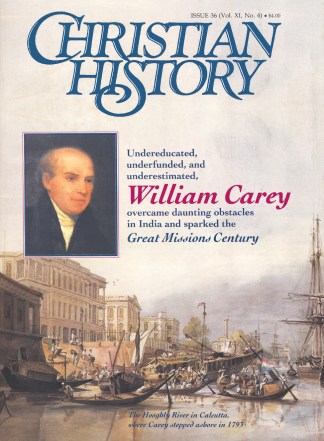William Carey translated the complete Bible into 6 languages, and portions into 29 others, yet he never attended the equivalent of high school or college. His work was so impressive, that in 1807, Brown University conferred a Doctor of Divinity degree on him.
William Carey is often called the Father of Modern Protestant Missions. But the first European Protestant missionaries to Asia arrived almost a century before he did. By the time Carey established his mission community, there were thousands of Christians in a Pietist-led settlement in southern India.
William Carey’s ministry sparked a new era in missions. One historian notes that his work is “a turning-point; it marks the entry of the English-speaking world on a large scale into the missionary enterprise—and it has been the English-speaking world which has provided four-fifths of the [Protestant] missionaries from the days of Carey until the present time.”
Due to an illness, Carey lost most of his hair in his early twenties. He wore a wig for about ten more years in England, but on his way to India, he reportedly threw his wig in the ocean and never wore one again.
This famous phrase is the best-known saying of William Carey, yet Carey never said it this way. In a sermon he declared, “Expect great things! Attempt great things!” The phrases “from God” and “for God” were added by others because the sermon’s context implied God’s role.
Carey was married three times, and he baptized all three of his wives.
At age 12, Carey taught himself Latin. Later, also on his own, he mastered Greek, Hebrew, French, and Dutch. During his life he learned literally dozens of languages and dialects.
Carey was a social-political radical. Unlike most of his British countrymen, he was sympathetic to the American colonists during the American War of Independence. He also boycotted sugar from the West Indies because he so intensely opposed to slavery.
It was illegal for Carey’s father to hear his son preach. In 1719 Parliament prohibited anyone attending a meeting of “Dissenters” (which a Baptist like Carey was) from teaching. Carey’s father was a schoolmaster, so he didn’t hear his son preach for some time. When he finally did come, he crept in the church and sat at the back.
Though William Carey preached one of the most influential sermons of all time (“Expect great things! Attempt great things!”), he failed in his first bid to become ordained. The reason: his preaching was boring. It took two years before the ordination committee was satisfied with his preaching.
When Carey entered India, he was an illegal alien. Any European wishing to live in British India needed a license from the East India Company, which refused to grant licenses for missionary work. It felt that “interfering in the religious opinions of the natives” might cause a backlash among Indians and hurt business. It wasn’t until 20 years later, by act of Parliament, that missionaries could get such licenses.
Carey never took a furlough from missionary service. He lived and worked in India for nearly 41 years.
William Carey helped to found Serampore College, the first Christian college in Asia. It continues today.
Carey’s written English was poor, both in spelling and punctuation. His chief supporter once wrote to him, “I never knew a person of so much knowledge as you profess in other languages write English so bad.”
Carey and the Serampore mission team developed the first Bengali Bible and the first Bengali newspaper. Carey and his colleagues essentially laid the foundation for modern Bengali literature. As one linguist put it, they raised Bengali “from its debased condition of an unsettled dialect to the character of a regular and permanent form of speech,” capable of becoming “a vehicle of a great literature.”
Carey proposed a world missionary conference—an idea 100 years ahead of its time. He proposed a meeting to be held at the Cape of Good Hope in 1810. The idea was considered outlandish. But it was eventually incarnated in 1910 at the now-famous World Missionary Conference in Edinburgh.
Dr. R.E. Hedland is missionary lecturer for the Conservative Baptist Fellowship Mission Society in Mylapore, India. He is the author of The Mission of the Church in the World (Baker, 1991).
Copyright © 1992 by the author or Christianity Today/Christian History magazine.Click here for reprint information on Christian History.








